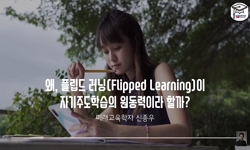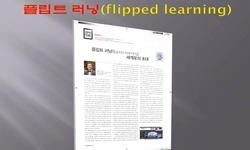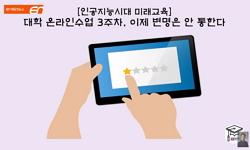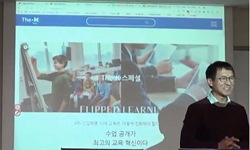Objective : The purpose of this study is to investigate the meaning of students’ experience participating in the flipped learning based instruction in sensory integration, and to understand the demand and introspection of participants. Methods : Thi...
http://chineseinput.net/에서 pinyin(병음)방식으로 중국어를 변환할 수 있습니다.
변환된 중국어를 복사하여 사용하시면 됩니다.
- 中文 을 입력하시려면 zhongwen을 입력하시고 space를누르시면됩니다.
- 北京 을 입력하시려면 beijing을 입력하시고 space를 누르시면 됩니다.

대학생의 플립드 러닝 기반 감각통합치료 수업 경험에 관한 현상학적 연구 = Phenomenological Study on Students’ Experiences of Flipped Learning-Based Class of Sensory Integration Therapy
한글로보기https://www.riss.kr/link?id=A104477580
- 저자
- 발행기관
- 학술지명
- 권호사항
-
발행연도
2017
-
작성언어
Korean
- 주제어
-
KDC
510
-
등재정보
KCI등재
-
자료형태
학술저널
- 발행기관 URL
-
수록면
80-92(13쪽)
-
KCI 피인용횟수
0
- DOI식별코드
- 제공처
-
0
상세조회 -
0
다운로드
부가정보
다국어 초록 (Multilingual Abstract)
Objective : The purpose of this study is to investigate the meaning of students’ experience participating in the flipped learning based instruction in sensory integration, and to understand the demand and introspection of participants. Methods : This study used a phenomenological approach of qualitative study. The participants were 10 students in 3rd year of the occupational therapy program in K Univeristy. Data information was collected by one-to-one interview and analyzed through phenomenological research method. Results : Through the interview, 20 units of meaning, 8 central meanings, and 3 themes were drew. The information collected were analyzed into three themes; Learning Experiences in Online and Offline Courses, Request and Introspection of Learners on Flipped Learning. The result showed that online courses brought learners convenience and satisfaction with repeatable learning in every time and space the learner want. However, the learners appealed issues of communication and concentration due to the absence of face-to-face instruction by their instructor. For the offline courses, students showed interest in various practical classwork of sensory integration and changes in their attitude to actively engage in the practical classes. Conclusion : Flipped learning based instruction was effective for the sensory integration classes which require practice in terms of time securement and immersion in practice. The learners requested for adopting flipped learning based instruction to other subjects in occupational therapy curriculum, and introspected that they needed to actively engage in classes through the experience of flipped learning-based classes of sensory integration. The results of this study can be used as a basic resource when flipped learning classes are planned in occupational therapy education.
국문 초록 (Abstract)
목적 : 플립드 러닝기반 감각통합치료 수업을 받은 작업치료 대학생의 경험의 의미를 파악하고 수업 후 학습자의 요구와성찰을 알아보는 것이다. 연구방법 : 대학생의 플립드 러닝 기반 감...
목적 : 플립드 러닝기반 감각통합치료 수업을 받은 작업치료 대학생의 경험의 의미를 파악하고 수업 후 학습자의 요구와성찰을 알아보는 것이다. 연구방법 : 대학생의 플립드 러닝 기반 감각통합치료 수업 경험에 관한 질적 연구 중 현상학적 연구방법을 사용하였다. 본 연구의 대상자는 2017년 1학기 K대학교 작업치료학과 전공필수과목인 ‘감각통합치료 및 실습’을 수강한 3학년 학생중 10명이다. 자료 수집을 위해 일대일 면담방법을 이용하였고, 녹음한 면담내용을 전사하여 분석하였다. 결과 : 의미단위 20개, 중심의미 8개, 주제 3개가 도출되었다. 연구결과는 온라인 수업에서의 학습경험, 오프라인 수업에서의 학습경험, 플립드 러닝에 대한 학습자의 요구와 성찰의 주제로 분석하였다. 온라인 수업은 원하는 시간과 공간에서학습할 수 있다는 편리함과 반복학습의 만족감을 가져왔다. 하지만 교수와의 면대면 수업의 부재로 소통과 집중력의문제를 호소하였다. 오프라인 수업에서는 다양한 감각통합 실습수업에 흥미를 보였고, 적극적인 실습태도의 변화가있었다. 결론 : 실습이 요구되는 감각통합 수업에 플립드 러닝 기반 수업은 시간의 확보와 실습 몰입 면에서 효과가 있었다. 다른작업치료교과목도 플립드 러닝으로 수업하고 싶다는 요구가 있었으며, 플립드 러닝 수업을 통해 능동적인 학습 자세가필요하다는 성찰이 있었다. 본 연구의 결과는 작업치료 교육 분야에서 플립드 러닝 수업을 시도하는데 기초자료로 제공하고자 한다.
참고문헌 (Reference)
1 서미옥, "혼합연구를 통해 본 플립드 러닝의 영향과 인식" 한국교육공학회 32 (32): 535-570, 2016
2 이지연, "학습자 중심 플립드러닝(Flipped Learning) 수업의 적용 사례" 한국교육공학회 30 (30): 163-191, 2014
3 함영주, "플립드러닝(flipped learning)을 활용한 성경교수실행모형개발" 개혁신학회 34 : 241-267, 2015
4 서미옥, "플립드 러닝의 효과성에 대한 메타분석" 한국교육공학회 32 (32): 707-741, 2016
5 이소현, "플립드 러닝을 활용한 한국어 문법 교육의 실제 - 대학 학부 한국어 문법 수업을 중심으로 -" 한국언어문화교육학회 11 (11): 221-262, 2015
6 이동엽, "플립드 러닝(Flipped Learning) 교수학습 설계모형 탐구" 한국디지털정책학회 11 (11): 83-92, 2013
7 소만섭, "플립드 러닝 기반 독일어문법 수업" 한국독어독문학교육학회 63 (63): 7-27, 2015
8 엄성원, "플립 러닝을 활용한 대학 글쓰기 교육의 모형 연구" 한국 리터러시 학회 (15) : 73-97, 2016
9 임정완, "영어과 예비교사를 위한‘거꾸로 교실’ 수업 모형과 적용" 한국영어어문교육학회 21 (21): 157-173, 2015
10 배도용, "대학에서의 플립드 러닝 수업의 적용 사례 연구" 우리말학회 (41) : 179-202, 2015
1 서미옥, "혼합연구를 통해 본 플립드 러닝의 영향과 인식" 한국교육공학회 32 (32): 535-570, 2016
2 이지연, "학습자 중심 플립드러닝(Flipped Learning) 수업의 적용 사례" 한국교육공학회 30 (30): 163-191, 2014
3 함영주, "플립드러닝(flipped learning)을 활용한 성경교수실행모형개발" 개혁신학회 34 : 241-267, 2015
4 서미옥, "플립드 러닝의 효과성에 대한 메타분석" 한국교육공학회 32 (32): 707-741, 2016
5 이소현, "플립드 러닝을 활용한 한국어 문법 교육의 실제 - 대학 학부 한국어 문법 수업을 중심으로 -" 한국언어문화교육학회 11 (11): 221-262, 2015
6 이동엽, "플립드 러닝(Flipped Learning) 교수학습 설계모형 탐구" 한국디지털정책학회 11 (11): 83-92, 2013
7 소만섭, "플립드 러닝 기반 독일어문법 수업" 한국독어독문학교육학회 63 (63): 7-27, 2015
8 엄성원, "플립 러닝을 활용한 대학 글쓰기 교육의 모형 연구" 한국 리터러시 학회 (15) : 73-97, 2016
9 임정완, "영어과 예비교사를 위한‘거꾸로 교실’ 수업 모형과 적용" 한국영어어문교육학회 21 (21): 157-173, 2015
10 배도용, "대학에서의 플립드 러닝 수업의 적용 사례 연구" 우리말학회 (41) : 179-202, 2015
11 김남익, "대학에서의 거꾸로 학습(Flipped learning) 사례 설계 및 효과성 연구: 학습동기와 자아효능감을 중심으로" 한국교육공학회 30 (30): 467-492, 2014
12 임상훈, "대학생들은 플립드러닝수업을 통해 어떤 경험을 하는가?" 한국교육정보미디어학회 22 (22): 777-803, 2016
13 임정훈, "대학교육에서 플립러닝(Flipped Learning)의 효과적 활용을 위한 교수학습 전략 탐색: 사례 연구" 한국교육공학회 32 (32): 165-199, 2016
14 한형종, "대학 역전학습 온·오프라인 연계 설계전략에 관한 연구" 한국교육공학회 31 (31): 1-38, 2015
15 김용석, "대학 교양영어 수업에 거꾸로 수업(flipped class) 교수법 적용 후 정서적 경험, 학업성취도와 수업 만족도 측면에서의 효과" 한국외국어교육학회 22 (22): 227-254, 2015
16 이현구, "대학 ESP 수업에서 플립드 러닝(Flipped Learning)을 통한 교수-학습이 학습자의 영어 성취도와 정의적 요인에 미치는 효과" 한국언어연구학회 20 (20): 73-99, 2015
17 박수향, "기초의학 과목에서 동영상 사전학습을 적용한 플립드 러닝의 만족도 연구" 한국엔터테인먼트산업학회 11 (11): 261-269, 2017
18 김보경, "교직수업을 위한 역진행 수업모형 개발" 교육종합연구소 12 (12): 25-56, 2014
19 Giorgi, A., "The question of validity in qualitative research" 33 (33): 1-8, 2002
20 Choi, J. E., "The effect of the flipped learning in the science class on the science achievement and class participation of middle school students" Soongsil University 2015
21 Kim, K. M., "The change of sensory integration education program in Korea and Japan" 3 (3): 79-84, 2005
22 Travis Roach, "Student perceptions toward flipped learning: New methods to increase interaction and active learning in economics" Elsevier BV 17 : 74-84, 2014
23 Kim, K. M., "Sensory integration Q & A" Jeong Dam Pub 2003
24 Park, S. Y, "Problem based learning: An option in occupational therapy" 11 (11): 99-109, 2003
25 Kolb, A. Y., "Learning styles and learning spaces: Enhancing experiential learning in higher education" 4 (4): 193-212, 2005
26 Dulffy, T. M., "Handbook of research on educational communications and technology" Scholastic 170-198, 1996
27 Randall S. Davies, "Flipping the classroom and instructional technology integration in a college-level information systems spreadsheet course" Springer Nature 61 (61): 563-580, 2013
28 Sahin, A., "Flipping a college calculus course: A case study" 18 (18): 142-152, 2015
29 Allison Nederveld, "Flipped learning in the workplace" Emerald 27 (27): 162-172, 2015
30 Ellen S. Cohn, "Facilitated Learning Model to Teach Habits of Evidence-Based Reasoning Across an Integrated Master of Science in Occupational Therapy Curriculum" AOTA Press 68 (68): 73-82, 2014
31 Corbett, A. C., "Experiential learning within the process of opportunity identification and exploitation" 29 (29): 473-491, 2005
32 Kim, J. A., "Effectiveness of flipped learning in project management class" 9 (9): 41-46, 2015
33 Guba, E. G., "Effective evaluation: Improving the usefulness of evaluation results through responsive and naturalistic approaches" Jossey-Bass 1981
34 Herreid, C. F., "Case studies and the flipped classroom" 42 (42): 62-66, 2013
35 Janice P. Burke, "A Systematic Focus on Occupational Therapy Education" AOTA Press 68 (68): S1-S2, 2014
동일학술지(권/호) 다른 논문
-
- 대한감각통합치료학회
- 최정실
- 2017
- KCI등재
-
- 대한감각통합치료학회
- 남궁영
- 2017
- KCI등재
-
상호작용식 메트로놈 중재가 주의력결핍과잉행동장애의 행동증상, 타이밍 및 운동기능에 미치는 효과
- 대한감각통합치료학회
- 구기쁨
- 2017
- KCI등재
-
경직형 양마비 아동의 과제지향훈련 시 무게조끼 적용이 대동작 수행력과 균형 능력에 미치는 영향
- 대한감각통합치료학회
- 권해연
- 2017
- KCI등재





 RISS
RISS eArticle
eArticle







